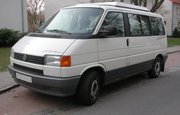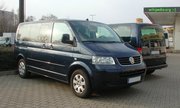VW Eurovan
|
|
The Eurovan was the first front-engined van of German automobile manufacturer Volkswagen and is the successor of the famous classic VW Type 2 van.
| Contents |
Variants
The Eurovan, as it is called in the United States, is available in Europe in many versions both for personal and commercial use. Only the passenger versions are exported to the US.
Passenger versions include the Caravelle, a bus-like van that seats up to nine; the Multivan, which is equipped for camping in a rather low-profile way (it does have a fridge and bed, but no cupboards, shower, or TV set); and the full-featured camping van, called the California in Europe. In the UK and Ireland, the range is sold under the Transporter brand. In the US, all models are called the Eurovan.
The commercial range is rather more substantial, and is also much more important in the European marketplace. It includes most notably:
- delivery van without side windows or rear seats (Panel Van)
- delivery van with raised roof (Highroof Panel Van; there's also a third roof height available with the T5, between the two traditional ones)
- van with side windows and removable rear seats (Kombi, from German Kombinationskraftwagen (combination vehicle), i.e. both a passenger and a cargo vehicle combined. Also available with heightened roof)
- van with side windows only in the front half of the cargo area, and only one row of removable rear seats (Half-panel)
- flatbed truck (Pick-up), also available with wider load bed
- flatbed truck with double cab and two rows of seats (Crewcab Pick-up)
- flatbed truck with lowered load bed
- naked chassis with cab (both single and crewcab), for coachbuilders to build special bodies onto
Apart from these factory variants, there are a multitude of third-party conversions available, some of which are offered through the VW dealer organization. They include almost everything conceivable, including but not limited to refrigerated vans, ambulances, police vans, fire engines, ladder trucks etc.
History
As early as the late 1970s, Volkswagen began to think about replacing their rear-engined Type 2 vans with a more modern, front-engined, water-cooled design, as they had very successfully done with their passenger cars earlier in that decade. The reason why in 1980 they still introduced a new rear-engined van instead is unclear; rumour has it that the unions feared the closing of VW's Salzgitter factory, where the boxer engines were built, and thus forced the new design to continue to use a boxer engine, and hence be rear-engined. Truth or not, the fact remains that the front-engined van was delayed until 1990.
In 2003, the T4 was replaced by the all-new T5 (see below).
T4
The T4 was the first Transporter without the rear engine, air-cooled or otherwise. This front-wheel-drive model, called the Eurovan in North America, was available in two wheelbases, and being front-engined allowed a far greater diversity for special bodies - from wreckers to three-axled minibuses to large box-bodied ambulances, almost everything was possible. Transversally mounted engines with four, five and six cylinders, and especially the very popular TDI diesel engines with direct injection, brought the Transporter's performance back to state of the art, which couldn't really be said about either the T2 or T3.
Enthusiasts naturally bemoaned the death of the classic Type 2, but rationally it really was inevitable. The market proves it: the T4 was a tremendous success, and the introduction of its successor was delayed time and again due to unabated demand. After no less than 14 years, the T4 ceased production in 2003 (making it second only to the T1 for length of production in its home market), but it is rumoured to be ressurrected for the Chinese market.
VW_Eurovan_T4b_Highroof_Halfpanel.jpg
There was one major model change to the T4, in 1994, when the re-shaped front end was introduced. This was needed to fit the six-cylinder VR6 engine into the Transporter's engine bay. However, the commercial variants, which were not available with the VR6, retained the old look (although they were changed as well, they just still looked almost the same). Keeping with the Type 2's tradition, these two versions are called T4a and T4b respectively.
VW_Eurovan_T4b_Caravelle.jpg
The engine range has become rather too large to elaborate here. T4a were available with four- and five-cylinder engines, both petrol and Diesel; the T4b saw not only the VR6, but also the five-cylinder TDI engines that since have replaced the traditional Diesels.
T5
The fifth generation of the VW Transporter hit the market in Europe late in 2003. It's a direct successor to the T4 in its looks and utility value, unlike the Microbus concept car that VW had been showing around several years prior to the T5's introduction. However, in keeping with the current trend of retro-styled automobiles, including Volkswagen's own New Beetle, there probably will be a production Microbus model which will have a number of styling cues that hearken back to the original.
External links
- Volkswagen UK New Transporter (http://www.volkswagen-vans.co.uk/newtransportershowroom) web site for the T5 commercial range
- Volkswagen UK New Caravelle (http://www.newcaravelle.co.uk/) web site for the T5 passenger range
Volkswagen Group
| ||
| Volkswagen | Audi | SEAT | koda | Bentley | Bugatti | Lamborghini
| ||
| Apollo | Lupo | Polo | Gol | Citi/CitiGolf | Golf | Jetta/Vento/Bora | Fox/Gacel | Scirocco | Corrado | Beetle/Bug | TL/Varient | Touran | K70 | Passat | Santana | Sharan | Phaeton | Pointer | Quantum | Touareg | Caddy | Eurovan/Transporter | LT | ||
| Beetle (Type 1) | Bus/Transporter (Type 2) | 1500/1600 (Type 3) | 411/412 (Type 4) | Karmann Ghia | Kübelwagen | Schwimmwagen | 1-litre concept | ||
| Edit this template (http://en.wikipedia.org/w/wiki.phtml?title=Template:VW&action=edit) | ||


